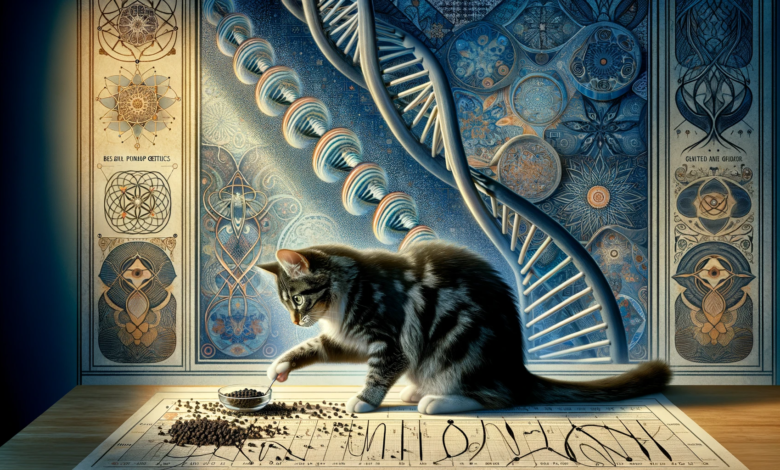Discover the Facts: Can Cats Have Black Pepper in Their Diet?

Specific threads seem oddly placed in the intricate tapestry of pet nutrition, yet they contribute to the overall pattern of understanding. One such thread questions the safety of everyday household spices like black pepper in a cat’s diet. This exploration sheds light on feline dietary preferences and weaves in an unexpected parallel – the concept of lousy bicep genetics – adding depth and contrast to our understanding of pet care. Let’s unravel these threads and discover the facts about feline nutrition and beyond.
Can Cats Have Black Pepper?
Black pepper, a common spice found in kitchens worldwide, is known for its pungent flavor and is often used to enhance the taste of various dishes. However, when it comes to our feline companions, black pepper might not be as benign.
A Feline’s Palate: More Than Meets the Eye
With their enigmatic aura, cats are obligate carnivores with a dietary secret. Their nutritional tapestry is woven predominantly with threads of animal-derived nutrients. Taurine, fatty acids, vitamins, and a rich tapestry of proteins colour their dietary needs. Some human-safe threads, like black pepper, might not blend well in this intricate pattern.
must read: Discover TickZoo: The Essential Guide for Wildlife Lovers – Tips, Reviews, and Insider Secrets
Black Pepper: A Speck of Spice in a Feline World

Black pepper, the ubiquitous spice that dances on the taste buds of humans, holds a different tune for cats. While a mere fleck might pass unnoticed, a generous sprinkle could introduce a dissonant pattern in a cat’s health.
The Pungent Intruder: Piperine
At the heart of black pepper lies piperine, a compound that can weave irritation and discomfort into a cat’s digestive tapestry. The symptoms – sneezing, gastrointestinal upset, or even an upset with the delicate balance of their diet – are the knots in the otherwise smooth pattern of a cat’s health.
A Curious Whisker: Behavioral Considerations
In their eternal curiosity, cats might find themselves nose-to-nose with this pungent intruder. A sniff or a tentative lick could lead to a sneeze or discomfort, a clear sign that this spice is an unwelcome thread in their dietary fabric.
Weaving Safe Dietary Patterns
Selecting threads that harmonize with their nutritional needs is essential in crafting a diet that resonates with feline health. Specially formulated cat foods, occasional treats of cooked, unseasoned meats, or a sprinkle of catnip can add variety and vibrancy to their meals.
The Unexpected Thread: Bad Bicep Genetics
In the loom of this discussion, the thread of lousy bicep genetics – typically a human concern – finds its way into the pattern. It reminds us that genetics can subtly colour the fabric of health and physique, whether in humans or cats. Understanding these genetic nuances allows us to tailor diets, exercise, and care to meet the unique needs of our pets, ensuring the tapestry of their life is as vibrant as possible.
The Masterpiece of Care
In concluding this exploration, it becomes clear that black pepper, while a staple in human diets, is a discordant thread in the dietary tapestry of cats. The risks it introduces are not in tune with the melody of feline health. As custodians of these enigmatic creatures, we must weave a tapestry of care that resonates with their needs, ensuring each thread contributes to a pattern of health, happiness, and longevity.
The interplay of diet, curiosity, and genetics crafts a narrative that is as intricate as it is fascinating. As we unravel the mysteries of feline nutrition and care, let’s ensure that every thread we introduce enriches the tapestry of their wellbeing. Remember, when faced with uncertainty, the wisdom of a veterinarian can guide you in choosing the threads that best fit the masterpiece of your pet’s life.
Frequently Asked Questions (FAQs)
Can cats eat black pepper?
Cats should not eat black pepper. It contains piperine, which can irritate their senses and cause gastrointestinal discomfort. Even small amounts might lead to sneezing, coughing, or an upset stomach.
What should I do if my cat ingests black pepper?
If your cat consumes a significant amount of black pepper, monitor for signs of distress such as coughing, sneezing, vomiting, or diarrhoea. Consult your veterinarian for advice, especially if symptoms persist or are severe.
Are there any spices or herbs safe for cats?
Yes, some herbs and spices, such as catnip and fresh cat grass, are safe for cats in moderation. Always consult your vet before introducing new foods or spices into your cat’s diet.
How can I safely add variety to my cat’s diet?
Consider adding small amounts of cooked, unseasoned meats like chicken, turkey, or beef as a treat. Commercial cat treats formulated for feline health are also a safe option. Remember, these should only be given in moderation, not replace a balanced, species-appropriate diet.
How does the concept of lousy bicep genetics relate to cats?
While bad bicep genetics is a term typically associated with human fitness, it symbolizes the broader concept of genetic predispositions affecting physical characteristics and health. Acknowledging genetic backgrounds can help tailor diets, exercise routines, and health care to meet individual needs, ensuring a happy and healthy life.
Remember, the key to a vibrant and healthy life for your cat lies in understanding and catering to their unique needs, respecting their dietary limitations, and seeking professional guidance when necessary. The care you weave into their lives enriches your shared journey, making every moment together a thread in the beautiful tapestry of companionship.
